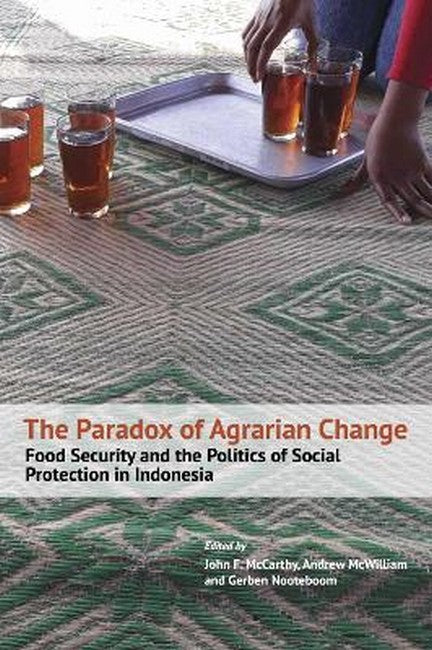John F. McCarthy is associate professor at the Crawford School of Public Policy at Australian National University. Andrew McWilliam is professor of anthropology at Western Sydney University. Gerben Nooteboom is associate professor in the Department of Anthropology at the University of Amsterdam.
Request Academic Copy
Please copy the ISBN for submitting review copy form
Description
Part One: Agrarian Change and Social Protection Introduction: Rural Change, Food Security and Social Protection in Indonesia Understanding Agrarian Change: Scenarios of Agricultural Development, Income Diversification, and Food Poverty in Indonesia Social Protection and the Challenge of Poverty in Indonesia Part Two: The analysis and structure of rural poverty Understanding the Nature of Rural Change in Central Java Progressing Sideways in the Rice Lands: Livelihood Change and Nutritional Insecurity in Aceh Agrarian change, vulnerability and the community economy in Sumba Agrarian Change and Oil Palm: Poverty dynamics and food security in Sumatra Poverty, Vulnerability and Social Protection in Mountain Java: The 'Haves and the Have Nots' Between the sea and a hard place: Fisheries degradation and livelihood precarity in a west Bali coastal community Sustaining Livelihoods from the Seas: Sama Bajo vulnerabilities and resilience. Part Three: Social Protection Are conditional cash transfers policies implementable? Social cash transfer and emergent patterns of entitlement in rural Aceh The Arrival and implementation of conditional cash transfers in Java Village politics, Ritual Deliberation, and the Problem of Beneficiary Mistargeting in Central Java. Conditional Cash Transfer and the Implications of Global Politics in the Development of Indonesia's Social Protection Policy Part Four: Conclusions Agrarian Change Scenarios and Social Assistance Conclusions and Implications Epilogue: The COVID-19 Pandemic, Changing Agrarian Scenarios and Social Assistance
"This book is best seen and read as a cohesive standalone volume rather than merely as an edited compilation. This perhaps is the strength of the book. The editors have done an adroit job in enabling the disparate chapters, entailing diverse aspects of agrarian scenarios, into a cogent and coherent package where each chapter is tied to and speaks with one another, which is not always the case in many edited books in the market... [This is] a good read for all interested in agrarian changes in Indonesia specifically, and methodologies utilized in the developmental process, in general."-- "Rising Asia Journal" "[This edited volume] is a genuine team effort and an excellent example of the insights that can be gained through sustained research collaboration between Australian and Indonesian researchers.... The book's strength lies in the diverse experiences of agrarian change. Its centre-piece is therefore the seven case study chapters (part 2 of the book), all of which are well written and engaging and provide insightful analyses of the diverse causes of contemporary rural poverty."-- "Bulletin of Indonesian Economic Studies" "I consider these [village-based] case studies to be the most interesting part of the book, especially those illustrating remote or unusual locations, such as East Sumba (Chapter 6) and the Sama Bajo fishing people of SE Sulawesi (Chapter 10), where the assistance of a strong community culture was especially beneficial....It was good to see so many Indonesian authors and the participation of 6 Indonesian universities, as well as 3 from Australia and 2 from the Netherlands."-- "Asia-Pacific Economic Literature" "This is one of the strong points of John McCarthy, McWilliam, and Nooteboom's work: sensitivity to the variety of agrarian change pathways. Another strong point can be found in the authors' conclusion, that to solve the agrarian change paradox in Indonesia there is a need to formulate 'other redistributive policy settings and strategies . . . which shift the structural driven of inequality and invest in the productive capacity of people to empower their future'... terima kasih Mas John and the authors for the excellent contribution to the agrarian study in Indonesia."-- "Indonesia" "The book exquisitely analyses why so many people from rural Indonesia are still vulnerable to nutritional insecurity whilst poverty rates are declining simultaneously. The book is a valuable addition to the existing literature and an interesting read for everyone working in agriculture, agrarian change and food security."-- "The Journal of Peasant Studies" "The Paradox of Agrarian Change highlights the important fact that even in rapidly developing countries such as Indonesia, the rural peasantry tend to be left behind and are overlooked - the result being increased vulnerability and declining food security for them and their families. The solution lies in a greater awareness of the issue to ensure better access to other resources for food security, such as land entitlement and agricultural support services." -- "Development in Practice"

